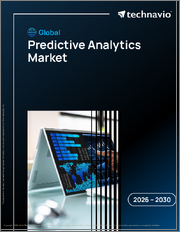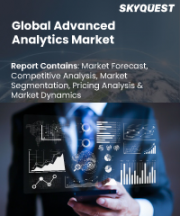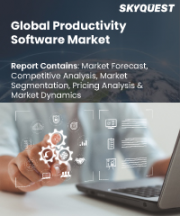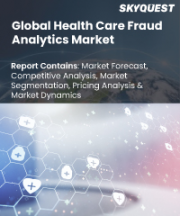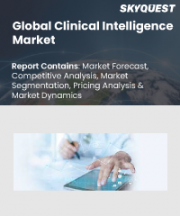
|
시장보고서
상품코드
1631193
예측 분석 시장 규모, 점유율, 동향 분석 보고서 : 구성요소별, 전개별, 기업 규모별, 최종 용도별, 지역별, 부문별 예측(2025-2030년)Predictive Analytics Market Size, Share & Trends Analysis Report By Component (Solutions, Services), By Deployment (Cloud, On-premise), By Enterprise Size, By End-use, By Region, And Segment Forecasts, 2025 - 2030 |
||||||
예측 분석 시장 성장과 동향
Grand View Research, Inc.의 최신 보고서에 따르면, 세계 예측 분석 시장 규모는 2025-2030년 동안 28.3%의 CAGR을 기록하며 2030년까지 823억 5,000만 달러에 달할 것으로 예상됩니다. 대량의 데이터 의존도와 AI, 머신러닝, 빅데이터와 같은 첨단 기술의 채택은 예측 기간 동안 예측 분석 솔루션에 대한 수요를 촉진할 것으로 예상됩니다. 이러한 솔루션은 수집된 데이터를 인사이트으로 변환하고, 예를 들어, 패턴을 감지하여 적절한 행동 방침을 결정합니다. 또한, 검색 광고 및 추천 엔진의 개발에도 도움이 되고 있습니다. 미래 시나리오를 예측하기 위해 사용 가능한 데이터와 그 분석의 중요성에 대한 인식이 높아짐에 따라 최종사용자에게 경쟁 우위를 제공함으로써 이러한 솔루션에 대한 수요가 증가하고 있습니다.
예측 분석 솔루션의 수요를 촉진하는 주요 요인은 제품 사용 편의성 향상, 신기술 채택, 방대한 데이터, 차별화 요소의 새로운 수단 등입니다. 또한, 데이터베이스 관리, 데이터 웨어하우스, 예측, 데이터 마이닝, 스마트 물류, CRM, 대시보드의 데이터 시각화에 대한 수요 증가가 시장 성장을 뒷받침하고 있습니다. 이러한 솔루션은 구매자 여정의 다양한 단계를 매핑하는 데 도움이 되며, 조직이 적절한 마케팅 캠페인을 채택할 수 있도록 돕습니다. 또한, 조직이 부서에 분석 기능을 갖추기 위해 이러한 솔루션에 대한 수요가 증가함에 따라 예측 기간 동안 시장 성장을 촉진할 것으로 예상됩니다.
예측 분석을 구현하는 기술에는 머신러닝, 딥러닝, 회귀, 회귀 모델링, 수학적, 텍스트 마이닝, 신경망, 유전 알고리즘, 클러스터링, 의사결정나무, 과거 및 현재 데이터로부터 인사이트를 얻기 위한 데이터 탐색 기술 등이 있습니다. 이러한 기술들은 CRM, 다이렉트 마케팅, 리스크 관리, 포트폴리오 관리, 사기 탐지, 언더라이팅, 신용 스코어링 등 다양한 애플리케이션에 적용되고 있습니다. 따라서 이러한 솔루션은 향후 몇 년 동안 전반적인 성과를 개선하기 위해 예측된 결과를 바탕으로 조직이 미래 전략을 결정하는 데 도움을 주고 있습니다.
이 솔루션은 BFSI, 의료, 소매, 제조, 정부, 스포츠, 운송 및 여행, IT, 에너지 유틸리티, 엔터테인먼트 등 다양한 최종 사용 산업에서 적용되고 있습니다. 이러한 솔루션은 앞서 언급한 업종에 걸쳐 다양한 애플리케이션을 관리하는 데 도움을 주고 있습니다. 예를 들어, 제조업의 경우, 이러한 솔루션은 장비 유지보수 관리, 인력 관리, 교차 판매 및 업셀링에 활용될 수 있습니다. 또한, IT 및 통신 산업에서는 해지 및 가격 책정 최적화를 통해 영업, 마케팅, CRM에 이러한 솔루션을 도입할 수 있습니다.
예측 분석 시장 보고서 하이라이트
- 구성요소별로는 데이터 기반 의사결정을 촉진하는 고급 분석 도구에 대한 수요 증가로 인해 솔루션 부문이 2024년 80.6%의 가장 큰 매출 점유율을 차지했습니다.
- 클라우드 플랫폼이 제공하는 비용 효율성, 데이터 처리 속도, 데이터 처리의 용이성으로 인해 클라우드 구축에 대한 수요가 증가할 가능성이 높습니다.
- 중소기업 부문은 예측 기간 동안 가장 높은 CAGR을 기록할 것으로 예상되는데, 이는 이러한 솔루션의 도움으로 전체 운영 비용을 절감하고 운영 성과를 개선해야 할 필요성이 증가하고 있기 때문입니다.
- 소매 및 E-Commerce 부문은 인터넷과 스마트폰 보급률의 증가와 전 세계 디지털화로 인해 예측 기간 동안 가장 빠른 성장을 보일 것으로 예상됩니다.
- 북미는 기술 발전과 미국 기업의 진출로 인해 세계 시장을 독점하고 있습니다. 벤처 캐피털의 신규 진입 기업에 대한 자금 지원은 시장 경쟁을 심화시킬 것으로 예상됩니다.
목차
제1장 조사 방법과 범위
제2장 주요 요약
제3장 예측 분석 시장 변수, 동향, 범위
- 시장 계통 전망
- 시장 역학
- 시장 성장 촉진요인 분석
- 시장 성장 억제요인 분석
- 산업 과제
- 산업 분석 툴
- PORTER의 분석
- PESTEL 분석
제4장 예측 분석 시장 : 구성요소별, 추정·동향 분석
- 예측 분석 시장, 구성요소별 : 주요 포인트
- 구성요소 변동 분석과 시장 점유율, 2024년과 2030년
- 구성요소별, 2018-2030년
- 솔루션
- 서비스
제5장 예측 분석 시장 : 전개별, 추정·동향 분석
- 예측 분석 시장, 전개별 : 주요 포인트
- 전개 변동 분석과 시장 점유율, 2024년과 2030년
- 전개별, 2018-2030년
- 클라우드
- 온프레미스
제6장 예측 분석 시장 : 기업 규모별, 추정·동향 분석
- 예측 분석 시장, 기업 규모별 : 주요 포인트
- 기업 규모 변동 분석과 시장 점유율, 2024년과 2030년
- 기업 규모별, 2018-2030년
- 중소기업
- 대기업
제7장 예측 분석 시장 : 최종 용도별, 추정·동향 분석
- 예측 분석 시장, 최종 용도별 : 주요 포인트
- 최종 용도 변동 분석과 시장 점유율, 2024년과 2030년
- 최종 용도별, 2018-2030년
- 항공우주와 방위
- 자동차·운송
- BFSI
- 의료
- IT와 통신
- 미디어와 엔터테인먼트
- 소매업과 E-Commerce
- 기타
제8장 예측 분석 시장 : 지역별, 추정·동향 분석
- 예측 분석 시장 : 지역별 전망
- 지역 시장 : 주요 포인트
- 지역별, 2018-2030년
- 북미
- 미국
- 캐나다
- 멕시코
- 유럽
- 영국
- 독일
- 프랑스
- 아시아태평양
- 중국
- 일본
- 인도
- 호주
- 한국
- 라틴아메리카
- 브라질
- 중동 및 아프리카
- 아랍에미리트
- 사우디아라비아
- 남아프리카공화국
제9장 경쟁 구도
- 기업 분류
- 기업의 시장 포지셔닝
- 기업 히트맵 분석
- 기업 개요/상장 기업
- SAS Institute Inc.
- IBM Corporation
- SAP SE
- Oracle
- Microsoft
- Salesforce, Inc.
- Alteryx.
- Altair Engineering Inc.
- Cloud Software Group, Inc.
- QlikTech International AB.
Predictive Analytics Market Growth & Trends:
The global predictive analytics market size is estimated to reach USD 82.35 billion by 2030, registering a CAGR of 28.3% from 2025 to 2030, according to a new report by Grand View Research, Inc. Massive data dependence and adoption of advanced technologies such as AI, machine learning, and big data is expected to drive the demand for predictive analytics solutions over the forecast period. These solutions transform collected data into insights; for instance, they detect patterns to determine a suitable course of action. They have also been instrumental in the development of search advertising and recommendation engines. Growing awareness about the importance of available data and its analysis for predicting the future scenario is offering a competitive edge to end users, thereby driving the demand for these solutions.
Key factors driving the demand for predictive analytics solutions are enhanced product usability, adoption of new technologies, massive data deluge, and newer levers of differentiators. In addition, growing need for database management, data warehouses, forecasting, data mining, smart logistics, CRM, and data visualization in dashboards is supporting the growth of the market. These solutions help map the various stages of the buyer journey, which would help organizations adopt suitable marketing campaigns, subsequently leading to higher sales and customer retention. Increasing demand for these solutions from organizations to equip their business functions with analytical capabilities are also expected to drive the growth of the market over the forecast period.
Techniques for implementing predictive analytics include machine learning, deep learning, regression, regression modeling, mathematical, text mining, neural nets, genetic algorithms, clustering, decision trees, and data exploration techniques to gain insights from historical and present data. These techniques are increasingly being adopted by organizations for various applications such as CRM, direct marketing, risk management, portfolio management, fraud detection, underwriting, and credit scoring. These solutions therefore help organizations decide future strategies based on predicted outcomes for enhancing the overall performance in the coming years.
These solutions find applications in various end-use industries such as BFSI, healthcare, retail, manufacturing, government, sports, transportation and travel, IT, energy and utilities, and entertainment. These solutions help manage diversified applications across the aforementioned verticals. For instance, in the manufacturing industry, these solutions can be used for equipment maintenance management, workforce management, and cross-selling and up-selling. Moreover, the IT and telecom industry can adopt these solutions in sales, marketing, and CRM by implementing churn and pricing optimization.
Predictive Analytics Market Report Highlights:
- By component, the solutions segment held the largest revenue share of 80.6% in 2024, due to the increasing demand for advanced analytical tools that facilitate data-driven decision-making.
- Demand for cloud deployment is likely to increase owing to cost-effectiveness, faster data-processing, and ease in data handling offered by cloud platforms.
- The small and medium enterprises segment is expected to register highest CAGR over the forecast period, owing to growing need for enhancing operational performance by reducing overall operational costs with the help of these solutions.
- The retail and e-commerce segment is predicted to witness fastest growth over the forecast period, owing to increasing internet and smartphone penetration, along with digitalization across the globe.
- North America dominates the global market owing to technological advancements and presence of players in U.S. Financial funding to new players from venture capitalists is projected to intensify the competition in the market.
Table of Contents
Chapter 1. Methodology and Scope
- 1.1. Market Segmentation and Scope
- 1.2. Market Definition
- 1.3. Information Procurement
- 1.3.1. Purchased Database
- 1.3.2. GVR's Internal Database
- 1.3.3. Secondary Sources and Third-Party Perspectives
- 1.3.4. Primary Research
- 1.4. Information Analysis
- 1.4.1. Data Analysis Models
- 1.5. Market Formulation and Data Visualization
- 1.6. Data Validation and Publishing
Chapter 2. Executive Summary
- 2.1. Market Snapshot
- 2.2. Segment Snapshot
- 2.3. Competitive Landscape Snapshot
Chapter 3. Predictive Analytics Market Variables, Trends and Scope
- 3.1. Market Lineage Outlook
- 3.2. Market Dynamics
- 3.2.1. Market Driver Analysis
- 3.2.2. Market Restraint Analysis
- 3.2.3. Industry Challenge
- 3.3. Industry Analysis Tools
- 3.3.1. PORTER's Analysis
- 3.3.1.1. Bargaining power of the suppliers
- 3.3.1.2. Bargaining power of the buyers
- 3.3.1.3. Threats of substitution
- 3.3.1.4. Threats from new entrants
- 3.3.1.5. Competitive rivalry
- 3.3.2. PESTEL Analysis
- 3.3.2.1. Political landscape
- 3.3.2.2. Economic and social landscape
- 3.3.2.3. Technological landscape
- 3.3.1. PORTER's Analysis
Chapter 4. Predictive Analytics Market: Component Estimates and Trend Analysis
- 4.1. Predictive Analytics Market, By Component: Key Takeaways
- 4.2. Component Movement Analysis and Market Share, 2024 and 2030
- 4.3. Market Estimates and Forecasts, By Component, 2018 - 2030 (USD Million)
- 4.3.1. Solutions
- 4.3.1.1. Market Revenue Estimates and Forecasts, 2018 - 2030 (USD Million)
- 4.3.1.2. Customer Analytics
- 4.3.1.2.1. Market Revenue Estimates and Forecasts, 2018 - 2030 (USD Million)
- 4.3.1.3. Financial Analytics
- 4.3.1.3.1. Market Revenue Estimates and Forecasts, 2018 - 2030 (USD Million)
- 4.3.1.4. Marketing & Sales Analytics
- 4.3.1.4.1. Market Revenue Estimates and Forecasts, 2018 - 2030 (USD Million)
- 4.3.1.5. Network Analytics
- 4.3.1.5.1. Market Revenue Estimates and Forecasts, 2018 - 2030 (USD Million)
- 4.3.1.6. Customer Analytics
- 4.3.1.6.1. Market Revenue Estimates and Forecasts, 2018 - 2030 (USD Million)
- 4.3.1.7. Risk Analytics
- 4.3.1.7.1. Market Revenue Estimates and Forecasts, 2018 - 2030 (USD Million)
- 4.3.1.8. Supply Chain Analytics
- 4.3.1.8.1. Market Revenue Estimates and Forecasts, 2018 - 2030 (USD Million)
- 4.3.1.9. Web and Social Media Analytics
- 4.3.1.9.1. Market Revenue Estimates and Forecasts, 2018 - 2030 (USD Million)
- 4.3.2. Services
- 4.3.2.1. Market Revenue Estimates and Forecasts, 2018 - 2030(USD Million)
- 4.3.2.2. Deployment/Installation
- 4.3.2.2.1. Market Revenue Estimates and Forecasts, 2018 - 2030 (USD Million)
- 4.3.2.3. Support & Maintenance
- 4.3.2.3.1. Market Revenue Estimates and Forecasts, 2018 - 2030 (USD Million)
- 4.3.2.4. Training & Consulting
- 4.3.2.4.1. Market Revenue Estimates and Forecasts, 2018 - 2030 (USD Million)
- 4.3.1. Solutions
Chapter 5. Predictive Analytics Market: Deployment Estimates and Trend Analysis
- 5.1. Predictive Analytics Market, By Deployment: Key Takeaways
- 5.2. Deployment Movement Analysis and Market Share, 2024 and 2030
- 5.3. Market Estimates and Forecasts, By Deployment, 2018 - 2030 (USD Million)
- 5.3.1. Cloud
- 5.3.1.1. Market Revenue Estimates and Forecasts, 2018 - 2030 (USD Million)
- 5.3.2. On-Premise
- 5.3.2.1. Market Revenue Estimates and Forecasts, 2018 - 2030 (USD Million)
- 5.3.1. Cloud
Chapter 6. Predictive Analytics Market: Enterprise Size Estimates and Trend Analysis
- 6.1. Predictive Analytics Market, By Enterprise Size: Key Takeaways
- 6.2. Enterprise Size Movement Analysis and Market Share, 2024 and 2030
- 6.3. Market Estimates and Forecasts, By Enterprise Size, 2018 - 2030 (USD Million)
- 6.3.1. Small and Medium Size Enterprises
- 6.3.1.1. Market Revenue Estimates and Forecasts, 2018 - 2030 (USD Million)
- 6.3.2. Large Enterprises
- 6.3.2.1. Market Revenue Estimates and Forecasts, 2018 - 2030 (USD Million)
- 6.3.1. Small and Medium Size Enterprises
Chapter 7. Predictive Analytics Market: End Use Estimates and Trend Analysis
- 7.1. Predictive Analytics Market, By End Use: Key Takeaways
- 7.2. End Use Movement Analysis and Market Share, 2024 and 2030
- 7.3. Market Estimates and Forecasts, By End Use, 2018 - 2030 (USD Million)
- 7.3.1. Aerospace & Defense
- 7.3.1.1. Market Revenue Estimates and Forecasts, 2018 - 2030 (USD Million)
- 7.3.2. Automotive & Transportation
- 7.3.2.1. Market Revenue Estimates and Forecasts, 2018 - 2030 (USD Million)
- 7.3.3. BFSI
- 7.3.3.1. Market Revenue Estimates and Forecasts, 2018 - 2030 (USD Million)
- 7.3.4. Healthcare
- 7.3.4.1. Market Revenue Estimates and Forecasts, 2018 - 2030 (USD Million)
- 7.3.5. IT & Telecommunication
- 7.3.5.1. Market Revenue Estimates and Forecasts, 2018 - 2030 (USD Million)
- 7.3.6. Media & Entertainment
- 7.3.6.1. Market Revenue Estimates and Forecasts, 2018 - 2030 (USD Million)
- 7.3.7. Retail and E-commerce
- 7.3.7.1. Market Revenue Estimates and Forecasts, 2018 - 2030 (USD Million)
- 7.3.8. Others
- 7.3.8.1. Market Revenue Estimates and Forecasts, 2018 - 2030 (USD Million)
- 7.3.1. Aerospace & Defense
Chapter 8. Predictive Analytics Market: Regional Estimates and Trend Analysis
- 8.1. Predictive Analytics Market: Regional Outlook
- 8.2. Regional Marketplaces: Key Takeaways
- 8.3. Market Estimates and Forecasts, by Region, 2018 - 2030 (USD Million)
- 8.4. North America
- 8.4.1. Market Estimates and Forecasts, 2018 - 2030 (USD Million)
- 8.4.2. U.S.
- 8.4.2.1. Market Estimates and Forecasts, 2018 - 2030 (USD Million)
- 8.4.3. Canada
- 8.4.3.1. Market Estimates and Forecasts, 2018 - 2030 (USD Million)
- 8.4.4. Mexico
- 8.4.4.1. Market Estimates and Forecasts, 2018 - 2030 (USD Million)
- 8.5. Europe
- 8.5.1. Market Estimates and Forecasts, 2018 - 2030 (USD Million)
- 8.5.2. UK
- 8.5.2.1. Market Estimates and Forecasts, 2018 - 2030 (USD Million)
- 8.5.3. Germany
- 8.5.3.1. Market Estimates and Forecasts, 2018 - 2030 (USD Million)
- 8.5.4. France
- 8.5.4.1. Market Estimates and Forecasts, 2018 - 2030 (USD Million)
- 8.6. Asia Pacific
- 8.6.1. Market Estimates and Forecasts, 2018 - 2030 (USD Million)
- 8.6.2. China
- 8.6.2.1. Market Estimates and Forecasts, 2018 - 2030 (USD Million)
- 8.6.3. Japan
- 8.6.3.1. Market Estimates and Forecasts, 2018 - 2030 (USD Million)
- 8.6.4. India
- 8.6.4.1. Market Estimates and Forecasts, 2018 - 2030 (USD Million)
- 8.6.5. Australia
- 8.6.5.1. Market Estimates and Forecasts, 2018 - 2030 (USD Million)
- 8.6.6. South Korea
- 8.6.6.1. Market Estimates and Forecasts, 2018 - 2030 (USD Million)
- 8.7. Latin America
- 8.7.1. Market Estimates and Forecasts, 2018 - 2030 (USD Million)
- 8.7.2. Brazil
- 8.7.2.1. Market Estimates and Forecasts, 2018 - 2030 (USD Million)
- 8.8. Middle East and Africa
- 8.8.1. Market Estimates and Forecasts, 2018 - 2030 (USD Million)
- 8.8.2. UAE
- 8.8.2.1. Market Estimates and Forecasts, 2018 - 2030 (USD Million)
- 8.8.3. Saudi Arabia
- 8.8.3.1. Market Estimates and Forecasts, 2018 - 2030 (USD Million)
- 8.8.4. South Africa
- 8.8.4.1. Market Estimates and Forecasts, 2018 - 2030 (USD Million)
Chapter 9. Competitive Landscape
- 9.1. Company Categorization
- 9.2. Company Market Positioning
- 9.3. Company Heat Map Analysis
- 9.4. Company Profiles/Listing
- 9.4.1. SAS Institute Inc.
- 9.4.1.1. Company Overview
- 9.4.1.2. Financial Performance
- 9.4.1.3. Component Portfolio
- 9.4.1.4. Recent Developments/ Strategic Initiatives
- 9.4.2. IBM Corporation
- 9.4.2.1. Company Overview
- 9.4.2.2. Financial Performance
- 9.4.2.3. Component Portfolio
- 9.4.2.4. Recent Developments/ Strategic Initiatives
- 9.4.3. SAP SE
- 9.4.3.1. Company Overview
- 9.4.3.2. Financial Performance
- 9.4.3.3. Component Portfolio
- 9.4.3.4. Recent Developments/ Strategic Initiatives
- 9.4.4. Oracle
- 9.4.4.1. Company Overview
- 9.4.4.2. Financial Performance
- 9.4.4.3. Component Portfolio
- 9.4.4.4. Recent Developments/ Strategic Initiatives
- 9.4.5. Microsoft
- 9.4.5.1. Company Overview
- 9.4.5.2. Financial Performance
- 9.4.5.3. Component Portfolio
- 9.4.5.4. Recent Developments/ Strategic Initiatives
- 9.4.6. Salesforce, Inc.
- 9.4.6.1. Company Overview
- 9.4.6.2. Financial Performance
- 9.4.6.3. Component Portfolio
- 9.4.6.4. Recent Developments/ Strategic Initiatives
- 9.4.7. Alteryx.
- 9.4.7.1. Company Overview
- 9.4.7.2. Financial Performance
- 9.4.7.3. Component Portfolio
- 9.4.7.4. Recent Developments/ Strategic Initiatives
- 9.4.8. Altair Engineering Inc.
- 9.4.8.1. Company Overview
- 9.4.8.2. Financial Performance
- 9.4.8.3. Component Portfolio
- 9.4.8.4. Recent Developments/ Strategic Initiatives
- 9.4.9. Cloud Software Group, Inc.
- 9.4.9.1. Company Overview
- 9.4.9.2. Financial Performance
- 9.4.9.3. Component Portfolio
- 9.4.9.4. Recent Developments/ Strategic Initiatives
- 9.4.10. QlikTech International AB.
- 9.4.10.1. Company Overview
- 9.4.10.2. Financial Performance
- 9.4.10.3. Component Portfolio
- 9.4.10.4. Recent Developments/ Strategic Initiatives
- 9.4.1. SAS Institute Inc.
(주말 및 공휴일 제외)









